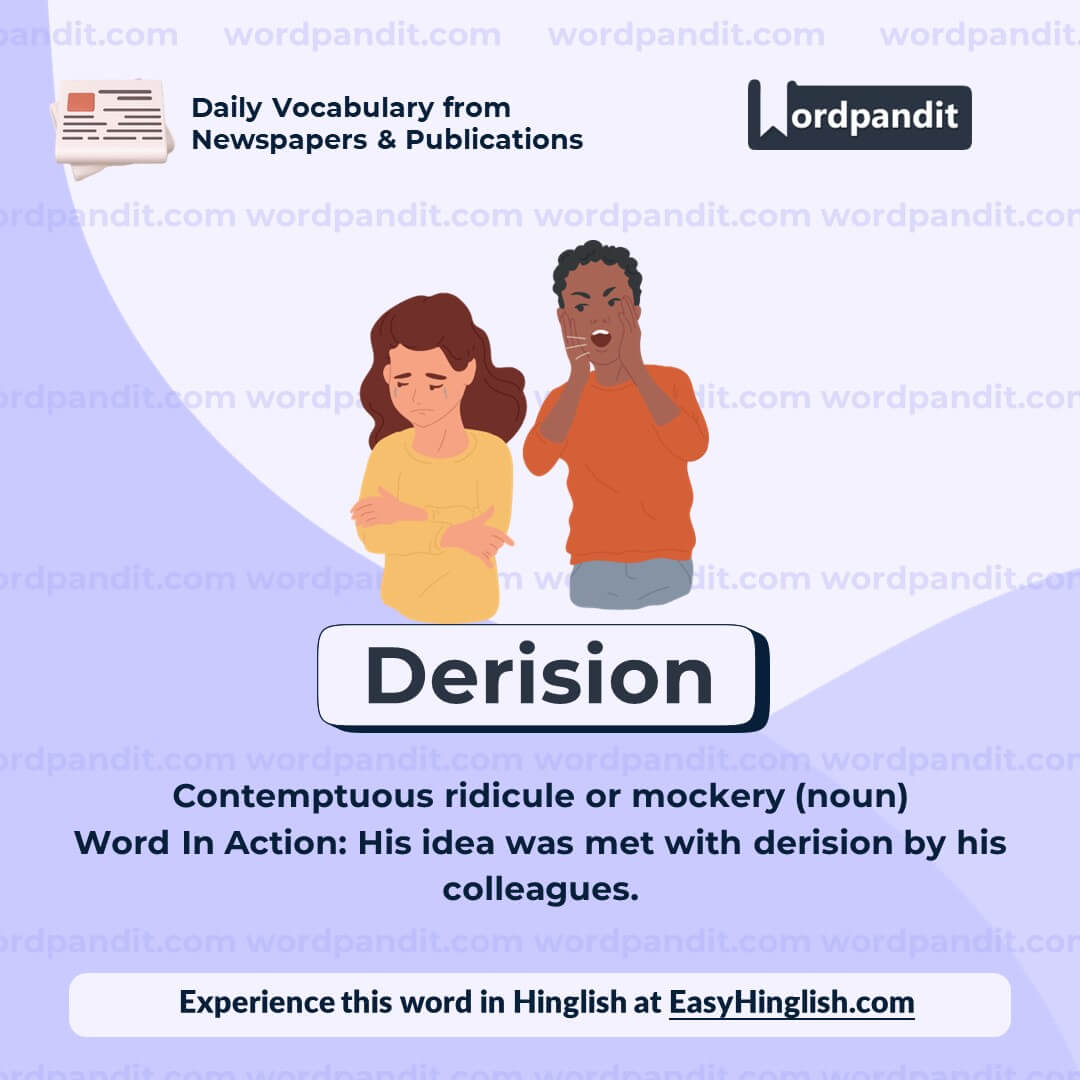Daily Vocabulary from Indian Newspapers and Publications
Welcome to Wordpandit’s Indian Vocabulary Hub
At Wordpandit, we understand the importance of staying rooted in the local context while expanding your language skills. This section focuses on enriching your vocabulary with words and phrases drawn from India’s leading newspapers and publications, ensuring you're learning vocabulary that is practical, relevant, and uniquely Indian.
Why Indian Sources Matter
We believe that the best way to master any language is by immersing yourself in local content. That’s why we carefully curate vocabulary from top Indian publications, including:
- The Hindu
- The Times of India
- The Economic Times
- Hindustan Times
- Live Mint
- The Indian Express
- And many others...
Stay Updated, Stay Relevant
With daily updates from Indian news sources, you’ll be consistently learning words that reflect the trends and shifts in Indian society and culture. Our focus is to provide vocabulary that enhances your understanding of the language in an Indian context.
How Wordpandit Supports Your Goals
Whether you’re preparing for exams, aiming to improve your professional communication, or simply want to stay connected with the latest Indian vocabulary, Wordpandit is here to guide you every step of the way.
Learn with a Practical Approach
Our interactive learning methodology includes real-world examples, engaging activities, and context-specific usage to ensure that every word becomes part of your active vocabulary.
Dive into Indian Vocabulary Today!
Why Choose Wordpandit?
Practical Learning: Focus on words you'll actually encounter in real-world reading, enhancing your comprehension and communication skills.
Diverse Content: From current affairs to scientific breakthroughs, our varied sources expose you to vocabulary across multiple domains.
Effortless Integration: Make Wordpandit a part of your daily routine. Just a few minutes each day can significantly boost your lexicon over time.
Your Path to Vocabulary Mastery
- Visit our Daily Vocabulary section regularly
- Explore new words and their usage in context
- Practice incorporating these words into your own writing and speech
- Track your progress as your vocabulary expands
Start Your Journey Today
Embark on your vocabulary enhancement journey with Wordpandit. By consistently engaging with our daily posts, you'll build a robust vocabulary that serves you well in academic, professional, and personal contexts.
Remember, a word a day keeps linguistic limitations at bay. Make Wordpandit your daily companion in the quest for vocabulary excellence!
WORD-1: Uproar
Context:
"In a move that not only echoes but intensifies the uproar sparked by INFOSYS chairman Narayana Murthy’s controversial suggestion of a 70-hour work week..." - The Wire
Explanatory Paragraph:
The word "uproar" refers to a situation marked by loud noise, commotion, or intense public reaction, typically stemming from anger, disagreement, or controversy. It is often used to describe a collective outburst of emotions or protests in response to a specific event or statement.
Meaning: A state of commotion, excitement, or loud disturbance, often caused by a public outcry (noun).
Pronunciation: UH-prohr
Difficulty Level: ⭐⭐ Beginner
Etymology: Derived from the Middle English word "uprore," which means tumult or disturbance, itself from the Dutch word "oproer," meaning rebellion or uprising.
Synonyms & Antonyms:
Synonyms: Commotion, chaos, tumult, outcry, pandemonium
Antonyms: Calm, serenity, peace, order, silence
Usage Examples:
- The politician's statement about reducing wages caused an uproar among the workers.
- There was an uproar in the courtroom when the controversial verdict was announced.
- Fans created an uproar after the sudden cancellation of the concert.
- The teacher's unfair grading policy led to an uproar from the students.
Cultural Reference:
"The Boston Tea Party in 1773 created a massive uproar among the British government and was a significant event that fueled the American Revolution." - History Archives
Think About It:
Why do you think certain issues cause an uproar while others are met with indifference? Is it the issue itself or the way it is communicated?
Quick Activity:
Write a short paragraph about a recent news event that caused an uproar. Use "uproar" and at least two of its synonyms in your writing.
Memory Tip:
Think of "uproar" as "uproarious uproar"—a noisy crowd roaring with protests or emotions. Picture a stadium filled with fans roaring in anger or excitement to make the word stick.
Real-World Application:
The word "uproar" is frequently used in media and news articles to describe public reactions to controversial statements, decisions, or events. It is also commonly used in literature to convey chaos or loud commotion.
WORD-2: Glorify
Context:
"Advocating for a 90-hour work week, Subrahmanyan’s remarks glorify excessive labour and normalise gendered division of labour." - The Wire
Explanatory Paragraph:
The word "glorify" means to praise or honor something excessively, often in a way that exaggerates its positive aspects or overlooks its negatives. It can also mean to make something appear more admirable or important than it actually is, sometimes at the cost of critical analysis. In the given context, it refers to portraying excessive work hours as commendable or worthy of admiration.
Meaning: To praise, honor, or elevate something or someone, often excessively or undeservedly (verb).
Pronunciation: GLOR-uh-fai
Difficulty Level: ⭐⭐ Intermediate
Etymology: From Latin "glorificare," derived from "gloria" (glory) + "facere" (to make), meaning "to make glorious."
Synonyms & Antonyms:
Synonyms: Exalt, praise, honor, celebrate, extol
Antonyms: Criticize, denounce, degrade, vilify, condemn
Usage Examples:
- The movie tends to glorify violence, ignoring its harmful effects on society.
- Some leaders glorify their nation's history to inspire patriotism among citizens.
- The coach’s speech glorified the hard work and dedication of the players, motivating them to perform better.
- Critics argued that the advertisement glorifies unhealthy eating habits by presenting oversized portions as desirable.
Cultural Reference:
"The song 'We Are the Champions' by Queen glorifies the spirit of victory and perseverance, making it a timeless anthem for celebrations." - Music Archives
Think About It:
Do you think glorifying certain practices or achievements can sometimes overshadow the negative consequences associated with them? Why?
Quick Activity:
Write three sentences using "glorify" in different contexts: one positive, one critical, and one neutral.
Memory Tip:
Think of "glorify" as "giving glory." Visualize a person shining a bright light on something to make it appear grand and admirable, even if it may not deserve it.
Real-World Application:
The word "glorify" is commonly used in critiques of media, advertisements, and speeches that excessively praise behaviors, ideas, or individuals. It encourages deeper thinking about what truly deserves admiration and why.
WORD-3: Derision
Context:
"Obviously, during BJP’s decade-long rule since 2014 under the leadership of Narendra Modi, the opposition has been treated with aggressive derision." - The Wire
Explanatory Paragraph:
The word "derision" refers to the act of ridiculing, mocking, or showing contempt for someone or something. It conveys a sense of scornful laughter or disdainful dismissal of ideas, people, or actions. In the given context, it highlights how the opposition was treated with disrespect and ridicule during political discourse.
Meaning: Contemptuous ridicule or mockery (noun).
Pronunciation: dih-RIH-zhun
Difficulty Level: ⭐⭐⭐ Advanced
Etymology: From Latin "deridere," meaning "to laugh at" or "mock," composed of "de-" (down) + "ridere" (to laugh).
Synonyms & Antonyms:
Synonyms: Mockery, ridicule, scorn, contempt, sneering
Antonyms: Respect, admiration, praise, approval, regard
Usage Examples:
- The comedian's jokes about the government were met with derision by certain political groups.
- The team's groundbreaking proposal was initially met with derision before it gained widespread support.
- She couldn’t ignore the derision in his tone when he commented on her work.
- The new policy drew derision from critics who deemed it impractical and poorly thought out.
Cultural Reference:
"Derision was a hallmark of political cartoons in the 18th and 19th centuries, where satirists used humor to ridicule powerful figures and societal norms." - Art and Satire History
Think About It:
Do you think derision is an effective way to challenge ideas or behavior, or does it shut down meaningful discussion? Why?
Quick Activity:
Write a short dialogue where one character expresses derision toward another's idea, and the second character responds thoughtfully. Use the word "derision" in the narration.
Memory Tip:
Think of "derision" as "de-rid-ing" someone—bringing them down by laughing or mocking. Imagine someone rolling their eyes and laughing scornfully to recall its meaning.
Real-World Application:
The word "derision" is often used in politics, debates, and critiques where ideas or individuals are dismissed in a mocking or contemptuous way. It helps convey the tone of hostility or ridicule in written or spoken arguments.
WORD-4: Redoubtable
Context:
"But as an Orchids-mad research student, I was fortunate that I was in the company of my Guruji, the redoubtable and now late Professor KS Manilal, while making my forays into the Silent Valley in the early eighties." - The Indian Express
Explanatory Paragraph:
The word "redoubtable" is used to describe someone who inspires respect, admiration, or even a sense of fear due to their powerful personality, achievements, or formidable qualities. In the given context, the late Professor KS Manilal is described as "redoubtable" to emphasize his remarkable stature, intellect, and influence in his field.
Meaning: Formidable, especially as an opponent; inspiring fear, respect, or awe (adjective).
Pronunciation: rih-DOW-tuh-buhl
Difficulty Level: ⭐⭐⭐ Advanced
Etymology: From Middle French "redoutable," derived from the Old French "redouter," meaning "to dread" or "to fear greatly," combining "re-" (intensifier) and "douter" (to doubt or fear).
Synonyms & Antonyms:
Synonyms: Formidable, impressive, commanding, awe-inspiring, fearsome
Antonyms: Unremarkable, unimpressive, weak, insignificant
Usage Examples:
- The redoubtable leader delivered a speech that left the audience in awe of her vision and determination.
- The redoubtable chess champion intimidated his opponents with his strategic brilliance.
- Known for her redoubtable intellect, she was a force to be reckoned with in academic debates.
- Despite his advancing age, the redoubtable general remained a symbol of strength and authority.
Cultural Reference:
"The redoubtable Winston Churchill, known for his indomitable spirit and oratory skills, remains one of the most respected leaders in history." - History Chronicles
Think About It:
What qualities or actions do you think make a person redoubtable? Can respect and fear coexist in someone's perception of another person?
Quick Activity:
Write a short paragraph about a historical or fictional character you find redoubtable. Use "redoubtable" in your description and explain why they inspire both admiration and awe.
Memory Tip:
Think of "redoubtable" as "worthy of being doubted (or feared) again." Picture a towering figure who inspires awe and respect, making you think twice before challenging them.
Real-World Application:
The word "redoubtable" is often used in literature, journalism, and speeches to describe influential figures, whether they are leaders, intellectuals, or opponents. It emphasizes their commanding presence and ability to inspire awe or fear.
WORD-5: Grilled
Context:
"During the interview, I was really grilled but MT who was on the panel did not ask me any question." - The Indian Express
Explanatory Paragraph:
The word "grilled" in this context refers to being questioned intensely or rigorously, often in a challenging or demanding manner. It is frequently used in interviews or interrogations where the person is subjected to a barrage of probing questions. The word conveys the idea of pressure or scrutiny during questioning, similar to the intense heat applied in grilling food.
Meaning: To question someone intensively and thoroughly, often in a challenging way (verb).
Pronunciation: gril-d
Difficulty Level: ⭐⭐ Intermediate
Etymology: Derived from the literal act of cooking on a grill, the figurative meaning evolved in the mid-17th century to describe the sensation of being 'heated' or 'pressured' during intense questioning.
Synonyms & Antonyms:
Synonyms: Interrogate, question, cross-examine, probe, quiz
Antonyms: Ignore, overlook, evade, bypass
Usage Examples:
- The lawyer grilled the witness for hours to uncover the truth about the incident.
- During the press conference, the politician was grilled by reporters about the recent scandal.
- He was grilled by his parents after coming home past midnight without any explanation.
- In preparation for the debate, she asked her friends to grill her with tough questions.
Cultural Reference:
"The word 'grilled' is often used in popular police dramas like 'Law & Order,' where detectives grill suspects to extract crucial information." - TV Tropes Archive
Think About It:
Do you think grilling someone during an interview is an effective way to assess their capabilities, or does it create unnecessary pressure?
Quick Activity:
Write a short dialogue where one character is grilling another about a mystery or event. Use "grilled" or related words creatively in the narration.
Memory Tip:
Picture yourself being placed on a literal grill, feeling the heat and pressure of tough questions. The imagery of grilling food can help you associate it with intense questioning.
Real-World Application:
The word "grilled" is widely used in both formal and informal contexts, such as job interviews, legal interrogations, or even casual conversations where someone is questioned thoroughly. It helps describe situations where a person is under pressure to provide answers.


















